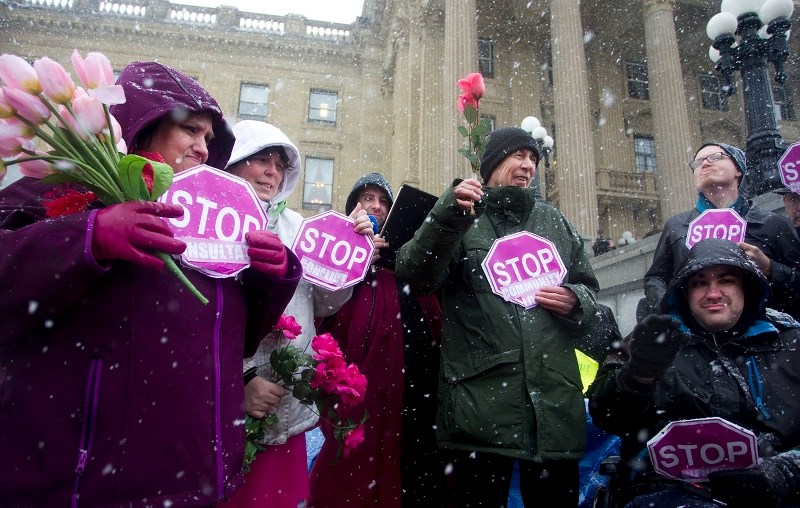Snow, slush and wind didn’t stop a rally protesting changes to housing rules for people with development disabilities from taking place at the Alberta Legislature Wednesday.
Carrying signs with slogans like “No decisions about us without us,” people with developmental disabilities and their allies from the Edmonton and Calgary regions staged a mock wedding on Wednesday, highlighting a loophole in the new standards that allows married people to avoid having their housing fall under those regulations.
April 1 was the deadline for compliance with the new rules, which include inspections to ensure safety standards are being adhered to. The level of standards depends on the municipality in which the people are residing.
Standard 8 also could result in renovations being required, and there is a concern this could result in people with disabilities losing their homes if landlords decide the renovations and inspections are too much to handle.
Dan Husing, a St. Albert resident who rents from his father, said his dad will have to make some changes to the home he rents.
What if his landlord was someone else? Husing asked and mused someone else probably wouldn’t make the changes, and he has friends who could be affected by the regulations.
“There’s lots of people in our homes who may be affected by these changes,” Husing said.
Alexander Lee and Michael Bodnar, two St. Albert roommates who also attended the rally, do not think the new rules were well thought out.
“I’d like them to hear that they can probably make decisions that are better for all of us,” Bodnar said. He’d also like for people with developmental disabilities to be involved in the decision-making process, a sentiment echoed by Lee.
Marie Renaud, executive director of St. Albert-based LoSeCa Foundation and a candidate for the NDP in the next provincial election, said there have been some six-month extensions granted but not much progress in getting changes made to the new requirements.
Renaud gave an example of a client in Edmonton who lives by himself. The water to the entire apartment building where he lives had to be shut off so mixing valves could be installed for him, a device meant to blend hot water with cold.
“He’s perfectly capable of running his own bath,” Renaud said.
The changes have been in the pipeline for a couple of years, the result of a fatality inquiry after a woman with Down’s syndrome died in a fire.
“The judge was very clear that we have an obligation to the safety of the people that are receiving PDD supports and that can only be ensured by inspection,” said Mike Berezowsky, assistant director of communications in the province’s human services ministry.
He said agencies having difficulties complying with the rules can apply for a six month extension.
There are working groups in Edmonton and Calgary as well as a provincial steering committee to look at how to address issues that are coming up, Berezowsky said.
“The extension is there to make sure they have the time to work through some of these issues if they’re having any difficulties or any challenges to meeting this,” he said.
There is a difference between a group home with paid staffing supports and a family situation or someone living with supportive roommates.
“The regulation applies where overnight staffing is provided to ... an individual with complex needs or two or more unrelated adults,” he said.
The goal is to make sure people are able to have time to get out of the home safely in the event of an emergency, Berezowsky said.
The inspections mean that the landlords have to obey standards that should apply to everyone, he said.
“Some of these standards are addressing things like the Public Health Act, which landlords are required to comply with anyways regardless of who the tenant is, and they’re supposed to meet fire codes,” Berezowsky said. “This is just a means of us making sure those requirements have been met.”
Renaud, though, worries how her agencies’ clients and others will be able to find housing if the landlords are facing inspections and possible upgrades.
“It’s really prohibitive,” she said.




